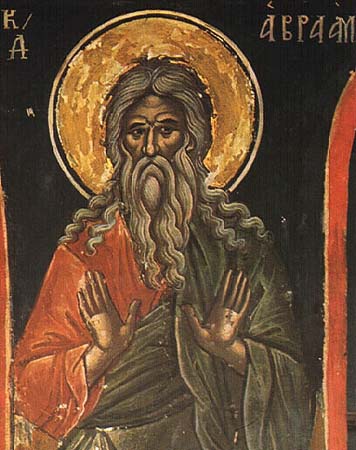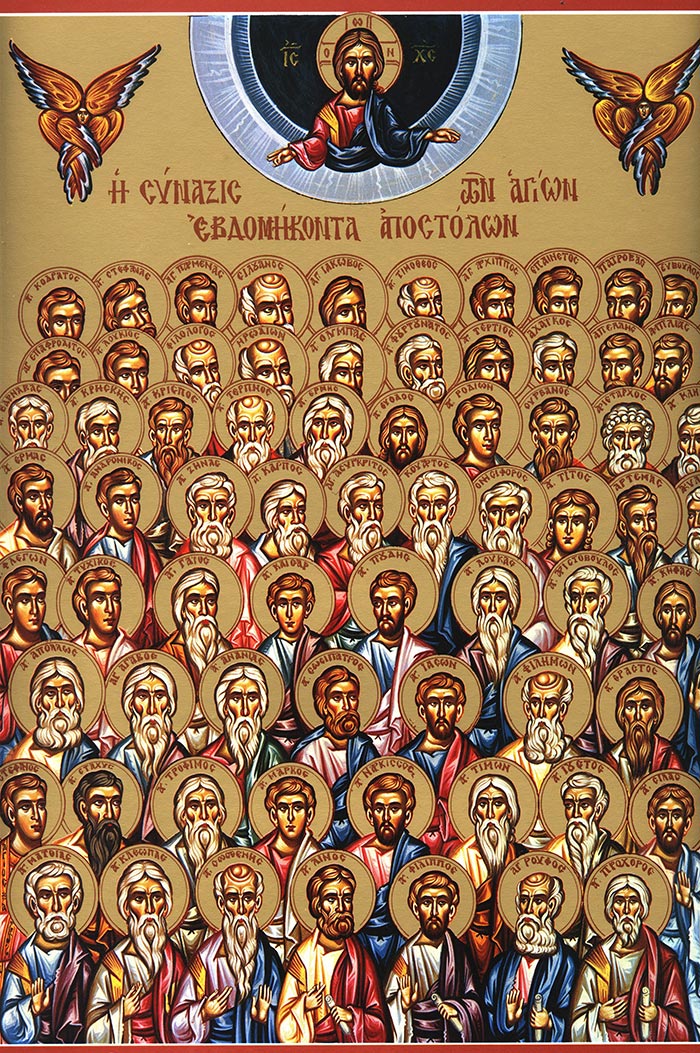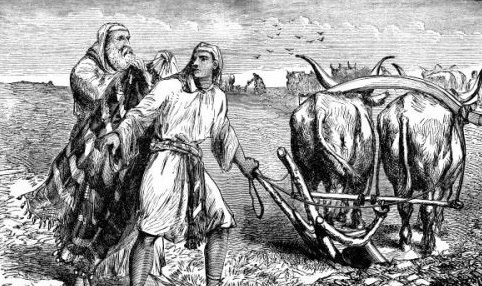

|
Go your way; behold, I send you out as lambs among wolves.
Carry neither money bag, knapsack, nor sandals; and greet no one along the road. In the Name of the Father and of the Son and of the Holy Ghost. Amen. |
Have you ever been surrounded by mortal danger being vulnerable in every way? A Sister of this Hermitage has survived several political coups. A coup is an extraordinary thing: a volcanic eruption that cannot be stopped and in which no one cares what the costs will be. It is a great, nationwide boiling cauldron — men in capital cities with guns, men in village streets wielding machetes with blood in their eyes. Our Sister had been offered evacuation by international, peace-keeping troops. (I was told this by a third party who was privy at first-hand to all of this.) But for her, religious vocation was not a hobby. Either it is real, or it is not real. And who wishes to retreat into make-believe when the time of life has come, when everything is on the line, and God is very Present?
During seasons of calm, visitors would invite her to splendid places for "vacation." She would always reply, "The poor do not 'go on vacation.' I cannot go where the poor cannot go. I am with them."
Today, the time of life has come: Jesus has sent all the disciples. I say "all," for the number seven represents fullness. Seventy indicates an indefinitely large number: all. We recall when Jesus told Peter that He must forgive those who seek forgiveness an indefinite number of times: "seventy times seven" (Mt 18:21-22). We celebrate the feast today, therefore, when everyone is sent.
They are sent into mortal danger: "lambs among wolves." They are commissioned into a life that is utterly divorced from the world. They have no money nor possessions. And they are not to socialize. They have come to bless. They have come to minister. They have come to console the afflicted. They have not come to form friendships.
The Scriptures direct our eyes always to this great divorce: the life with God, which we call the Kingdom of Heaven, from the life of the world, which St. John and St. Paul equate to the flesh and the devil,
|
among whom we all once lived in the passions of our flesh, carrying out the desires
of the body and the mind, and were by nature children of wrath, like the rest of mankind. (Eph 2:3) |
Where does it end? When can we say we finally are converted? When does a man or woman cross the line, no longer a burden to others but a dependable helper in the harvest? It is hard to say. It is hard to know. A master trait of the human mind is delusion. We lie to ourselves. Even the angels do not know which we are. It depends on what we do. In our sovereign freedom, any of us may do anything at any time.
Famously, after we die, we are tested (as we have been all our lives). In the Orthodox tradition, we are tried during a period of forty days after death depicted as "aerial tollhouses." St. Columba wrote that he saw newly deceased souls battling demons in the air. What are the demons saying? No one has recorded this. Concerning the past, we must imagine that they are making just claims against us. (The Hebrew Satan means "accuser.") They are giving testimony concerning our secret lives and secret faults, which we have never confessed and for which we have never been absolved. They will demand, "Are these things not so?" barring our entrance into Heaven.
Concerning the present, we must imagine that our character will be sounded through temptation. Will we take pleasure in what is set before us? Will our mind, will our imagination, respond in any way? Or will we be revulsed, truly past and done with that part of our lives?
From time to time we will read a sentence that awakens us from the trance of lies. I recall such a one, which I encountered decades ago, from Dietrich von Hildebrand's classic, Transformation in Christ (1948), the "Introduction" written by his wife, Alice:
|
Alas, I was too young to learn that enthusiasm for a virtue does not guarantee
possession of that virtue; and that a clear perception of the beauty of spiritual transformation can coexist with a deep reluctance to let oneself be re-formed by Christ. |
| Falling in love with the idea of conversion, yet never being converted. |
I recall the lies I told myself. "Why, I have rejected the passions of the flesh. I pray daily. I visit the sick and shut-in. I tithe. I have surrounded myself with all the right books and icons." But I had to admit that this was but one dimension of my life, not all of my life.
Did I not believe? Of course I believed. All faith begins here. But what is that? Even the demons believe .... and tremble (James 2:19).
But what is the path ahead? Shall one burn down ones whole world? The list of practical objections will be a long one. And no one will congratulate you if you do. Many will despise you.
Perhaps there is a middle way .... but then the mind clears, and we see our own outrage: What?! Bargain with God?! God does not make deals. He only see lives, whole lives. He does not get into our many, many details, explanations, excuses. You can leave those for your paid therapist.
Consider the young, wealthy ruler encountering Jesus:
| "Go, sell what you have and give to the poor!" (Mt 19:21) |
Will you answer the call? Then give up everything. What can you keep? Keep whatever will be necessary for the life ahead, a life devoted to God.
Another Sister of this Hermitage put her entire life behind her on a day and simply showed up in Haiti with a monk to introduce her to our community. She spent the rest of her life serving the apostolate and never looked back.
Later, a different man sought out Jesus:
|
Now it happened as they journeyed on the road, that someone said to Him,
"Lord, I will follow You wherever You go." And Jesus said to him, "Foxes have holes and birds of the air have nests, but the Son of Man has nowhere to lay His head." |

|
Then He said to another, "Follow Me." But he said, "Lord, let me first
go and bury my father." Jesus said to him, "Let the dead bury their own dead, but you go and preach the kingdom of God." (Lu 9:57-60) |
|
So [Elijah] departed from there, and found Elisha .... plowing
with twelve yoke of oxen before him, and he was with the twelfth. Then Elijah passed by him and threw his mantle on him. And he left the oxen and ran after Elijah, and said, "Please let me kiss my father and my mother, and then I will follow you." (1 Kings 19:19-20) |
How many of us have been called by God and "screened the call"? How many have promised ourselves that we will get back to Him later? What?! Put off God?! With a sense of shame, I admit that I entertained this logic once: "I will wait for my pension and then give my life to God." But God made it manifestly clear to me that His call was not for later. He was calling me now.
Elisha responds by burning down his career. Literally, he burns his plow and then uses the fire to cook twenty-four oxen, feeding "the people," that is, the poor.
God's call is always now.
He does not make an appointment to see you whenever you might make time for Him.
And
refusing Him carries a heavy cost
as Jonah discovered.

The great exemplar of the call is the Patriarch, St. Abraham:
|
By faith Abraham obeyed when he was called to go out to the place which he
would receive as an inheritance. And he went out, not knowing where he was going. |
Recently, we read about the Patriarchs who were called away from security and luxury, who "wandered about in sheepskin .... being destitute" (Heb 11:37). The Greek for this word is `υστερ'εω, (husterew), which means "to be inferior in influence, power, and rank, to be left behind in the race." Left behind?! In truth we have left the race, the "rat race" we say today.
What exactly is this race? It is mostly a game of "keeping your options open" and consumerism, that is, shopping for new options. Many a young man has lost the one love of his life forever in order to keep his options open. Many a young woman has taken the life of her own child in order to keep her options open. Something better might come along, they tell themselves. But the source of all love and of all life has come along. The moment of their lives was set before them. But they could not see it. For their kind of "living" cannot see life. Theirs is a death game, denying life until the end should come, when they should hear the irrevocable words, "Time's up."
There is only one life game. To many people, it makes no sense. It makes no sense that the King of the Universe should be born amongst lowly animals in dung-stained hay. It makes no sense that God should appear as a wandering, homeless, and destitute teacher. It makes no sense that God's favored ones are indistinguishable from the poor. It makes no sense to our consumerist society when the least is best or when the one seeking his life (self-interest) should lose it.
And what shall become of those who remain in love with the idea of conversion? Jesus is plainspoken on this subject:
|
[You] will knock at the door saying, 'Lord, Lord, open for us,' and He will
answer and say to you, 'I do not know you, where you are from,' then you will begin to say, 'We ate and drank in Your presence, and You taught in our streets. But He will say, 'I tell you I do not know you, ....'" (Lu 13:25-27) |
But if His peace be not received, He will depart. He has instructed his apostles to say this on His behalf upon leaving:
| "Nevertheless know this, that the Kingdom of God has come near you." |
| But I say to you that it will be more tolerable in that Day for Sodom than for that city. |